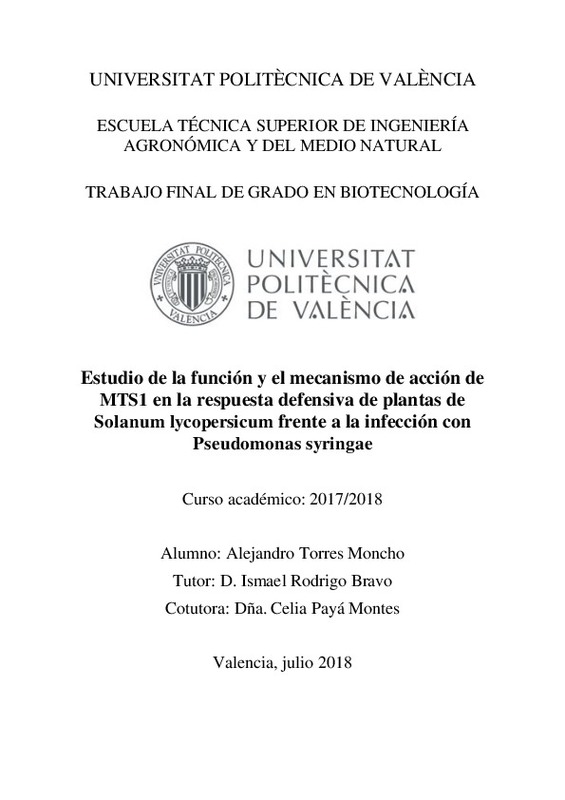|
Resumen:
|
[ES] En respuesta a diferentes agresiones por parte del entorno, tanto de tipo biótico como abiótico, las
plantas han desarrollado a lo largo de su evolución distintos sistemas de señalización y defensa,
tales como la ...[+]
[ES] En respuesta a diferentes agresiones por parte del entorno, tanto de tipo biótico como abiótico, las
plantas han desarrollado a lo largo de su evolución distintos sistemas de señalización y defensa,
tales como la síntesis de proteínas defensivas o compuestos químicos de muy variada naturaleza.
Entre otros, los compuestos orgánicos volátiles (VOCs) se incluyen en este grupo de compuestos
defensivos. Algunos de estos VOCs son compuestos monoterpénicos que intervienen en la
comunicación entre plantas y que podrían originar una mayor resistencia frente a la infección por
la bacteria Pseudomonas syringae.
En el presente Trabajo de Fin de Grado se plantea el estudio de la función de una monoterpeno
sintasa (MTS1) en la respuesta defensiva de plantas de tomate (Solanum lycopersicum) frente a
la bacteria Pseudomonas syringae pv. tomato DC3000. Este enzima, que participa en el
metabolismo secundario de las plantas, interviene en la producción de VOCs monoterpénicos,
tales como alfa-terpineol o linalool, cuya aplicación exógena da lugar al cierre estomático. De
esta forma, el objetivo del trabajo consiste en observar el efecto que genera el silenciamiento del
gen MTS1, responsable de la emisión de diversos monoterpenos, en plantas resistentes a la
infección bacteriana como consecuencia de una interacción de tipo incompatible. Para ello, se
realizará tanto el análisis de diferentes moléculas señalizadoras acumuladas ante el ataque del
patógeno, como la comprobación del incremento de la apertura estomática y la presencia de la
bacteria en las plantas transgénicas, debido a que los estomas son una de las posibles vías de
entrada de patógenos bacterianos.
Nuestros estudios pueden ampliar el conocimiento acerca de la importancia de los VOCs
monoterpénicos en la respuesta defensiva de las plantas frente a patógenos. Una vez conocida la
importancia del gen MTS1 en la comunicación entre plantas, su papel relevante en la respuesta
defensiva lo convierte en una futura herramienta biotecnológica, pues la obtención de plantas
transgénicas que aumenten la expresión del gen dará lugar también a un aumento de la respuesta
defensiva en las plantas vecinas, convirtiéndose así en una estrategia de gran utilidad en la
protección sostenible de cultivos.
[-]
[EN] In response to different aggressions by the environment, both biotic and abiotic, plants have
developed throughout their evolution different signaling and defense systems, such as the
synthesis of defensive proteins ...[+]
[EN] In response to different aggressions by the environment, both biotic and abiotic, plants have
developed throughout their evolution different signaling and defense systems, such as the
synthesis of defensive proteins or chemical compounds of very varied nature. Among others,
volatile organic compounds (VOCs) are included in this group of defensive compounds. Some of
these VOCs are monoterpenic compounds that intervene in the interplant communication and that
could cause greater resistance to infection by the bacterium Pseudomonas syringae.
In the present Degree Final Project, the study of the function of a monoterpene synthase (MTS1)
in the defensive response of tomato plants (Solanum lycopersicum) against the bacterium
Pseudomonas syringae pv. tomato DC3000 is proposed. This enzyme, which participates in the
secondary metabolism of plants, is involved in the production of monoterpenic VOCs, such as
alpha-terpineol or linalool, whose exogenous application leads to stomatal closure. In this way,
the objective of the work is to observe the effect generated by the silencing of the MTS1 gene,
responsible for the emission of various monoterpenes, in plants resistant to bacterial infection as
a result of an incompatible type interaction. For this, both the analysis of different signaling
molecules accumulated before the attack of the pathogen, as well as the verification of the increase
of the stomatal opening and the presence of the bacterium in the transgenic plants, will be carried
out, because the stomata are one of the possible routes of entry of bacterial pathogens.
Our studies can expand the knowledge about the importance of monoterpenic VOCs in the
defensive response of plants to pathogens. Once the importance of the MTS1 gene in the interplant
communication is known, its relevant role in the defensive response makes it a future
biotechnological tool, since the obtaining of transgenic plants that increase the expression of the
gene will also lead to an increase in the response defensive in neighboring plants, thus becoming
a very useful strategy in the sustainable protection of crops.
[-]
|







